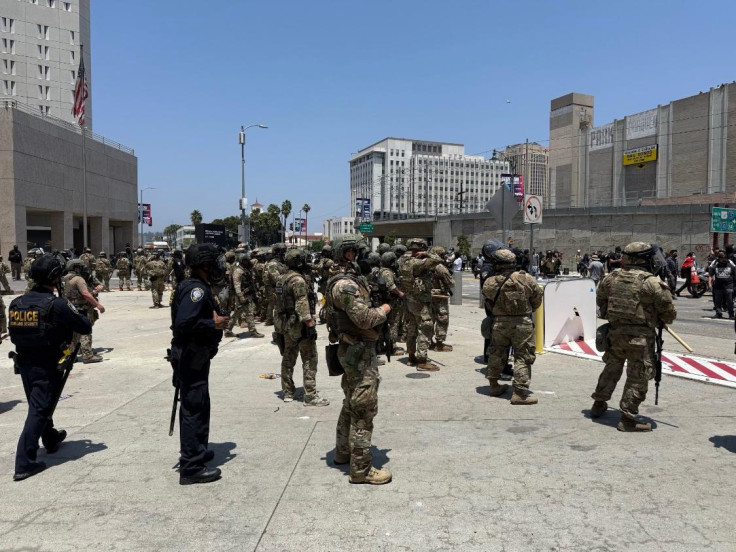LA Protests 2025: What Is The Riots About And Is It A Sign Of Trump's 'Dictatorship'?
Trump's unauthorised troop deployment has ignited fears of authoritarian overreach

The dramatic surge of protests in Los Angeles, triggered by federal immigration raids and President Trump's deployment of 2,000 California National Guard soldiers without state authorisation, has intensified fears of authoritarianism.
Many now question whether the United States is sliding toward dictatorship. Critics argue that Trump's unilateral actions, especially sending troops against state wishes, reflect a dangerous erosion of democratic norms, turning public protest into a referendum on the limits of presidential power.
Federal Overreach or Necessary Intervention?
President Trump invoked Title 10 of the U.S. Code to federalise the California National Guard and deploy them to Los Angeles. This bypassed the usual Title 32 process, which requires state consent. Governor Newsom described the action as illegal and unconstitutional, accusing Trump of acting like a dictator. The White House defended the deployment as essential to protect federal personnel and property during protests that followed Immigration and Customs Enforcement (ICE) raids in which over 100 undocumented immigrants were detained.
Legal experts warn that bypassing state authority without invoking the Insurrection Act could set a troubling precedent. Although the Insurrection Act has not been triggered, Defence Secretary Pete Hegseth confirmed on X that U.S. Marines are on high alert at Camp Pendleton in case the situation escalates. This is raising fears of further military involvement on U.S. soil as it could be one of the most significant federal deployments since the civil rights era.
Public Response and Political Fallout
Thousands of protesters have taken to the streets of Los Angeles, blocking the 101 Freeway and gathering outside federal buildings. About 30 to 60 people were arrested, and local police used tear gas and rubber bullets to disperse the crowd. The protests, mostly peaceful, have been met with a visible and often aggressive federal presence.
California's Democratic leaders, including Mayor Karen Bass and Senator Bernie Sanders, accused Trump of deliberately using military force to intimidate protestors. Sanders called the deployment 'a clear sign of creeping authoritarianism.'
However, law enforcement officials offered a different perspective. Los Angeles Police Chief Jim McDonnell said that while local police were managing the situation, the National Guard's presence provided critical support for protecting federal buildings and agents amid escalating tensions
Trump's Authoritarian Pattern?
Critics say Trump's actions in Los Angeles reflect a pattern of authoritarian behaviour. He has repeatedly dismissed state authority, labelled opponents as insurrectionists, and used militarised rhetoric against both political rivals and the press.
A conservative defender, Republican House Speaker Mike Johnson, told ABC News, 'The president did exactly what he needed to do. These are federal laws and we must maintain the rule of law... That is real leadership.' While critics warn this marks a shift toward authoritarian governance, defenders argue it was necessary to uphold federal authority and protect public safety.
The protests in Los Angeles have become more than a reaction to immigration raids. They have become a national moment of reckoning over the balance between presidential power and democratic accountability. While the United States is not officially a dictatorship, the use of federal troops without state consent and the demonisation of protest raise serious questions. Trump's actions in this case may be remembered not just as a political manoeuvre but as a warning of how democratic norms can be challenged under the guise of law and order.
© Copyright IBTimes 2025. All rights reserved.





















